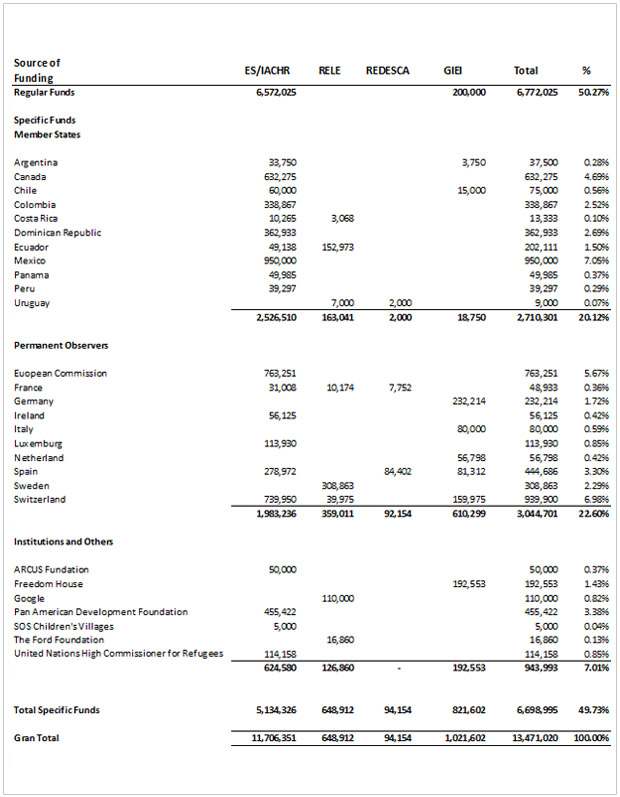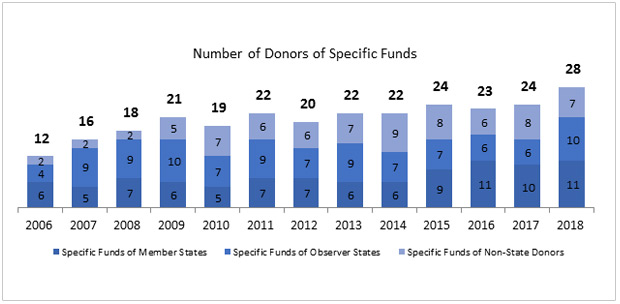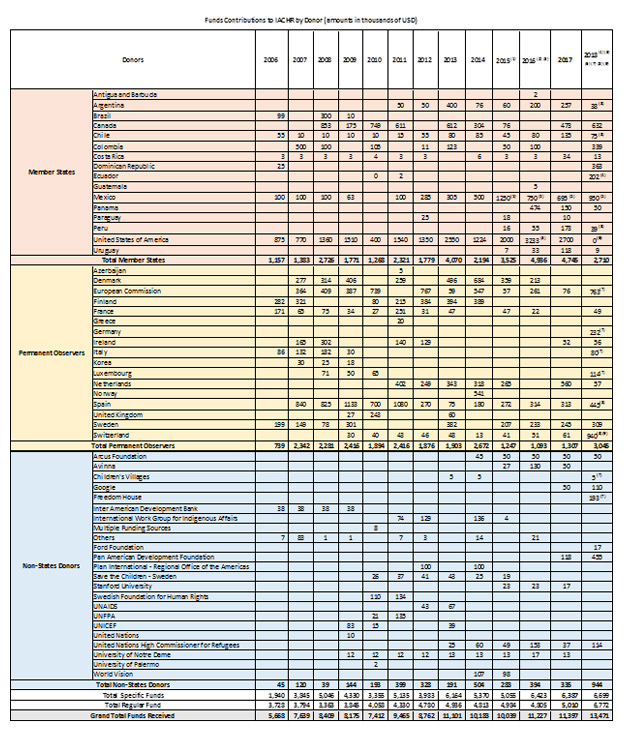- English
- Español
IACHR
Press Release
IACHR Presents Accountability Report for 2018 Budget
March 14, 2019
IACHR Press and Communication Office
Tel: +1 (202) 370-9000
[email protected]
Washington, DC—The Inter-American Commission on Human Rights (IACHR) presented its financial statement for 2018 and its accountability report on how the funds it received were spent.
The General Assembly of the Organization of American States (OAS) approved a budget of USD 7,505,200 for the IACHR in 2018. This represented a 33% increase on the 2017 budget. This increase was due to the fact that 2018 was the first year in which the OAS General Assembly’s decision to progressively double the budget allocated to the Inter-American System of Human Rights began to be implemented.
During the first year of the implementation process for doubling the budget, the IACHR significantly increased its effectiveness and efficiency in fulfilling its mandate, as was publicly reported at the presentation of the Annual Report on the Implementation of the IACHR Strategic Plan 2017–2021 and in the press release in which the IACHR reported on the unprecedented results of its work over the course of 2018.
“We wish to express once more how grateful the IACHR is to the OAS member states regarding their decision to double its budget, which was reached at the General Assembly in Cancún and was confirmed at the 2018 General Assembly,” said the president of the IACHR, Commissioner Esmeralda Arosemena de Troitiño,. “The OAS’s decision to double the budget was the most significant measure in the Commission’s history, and clearly demonstrated how the OAS is prioritizing the defense of human rights in the region through both its words and its deeds, therefore honoring the purpose of ensuring more rights for more people,” she said. “The next General Assembly, which will be held in Colombia and will mark the IACHR’s 60th anniversary, will consolidate this cycle that began in Cancún.”
The decision to double the IACHR’s funding was passed in June 2017 in Cancún and is being implemented through a 33% annual increase between 2018 and 2020. The decision paves the way for achieving an objective that the IACHR and the IA Court share with member states: maintaining the IASHR’s current institutional capacity for fulfilling its mandate with funding secured from the OAS member states themselves. This is the first step towards a shared objective, namely that the states themselves be the main sources of financing for the system they created and that they also be the ones to guarantee that the Inter-American System of Human Rights has the resources it needs to comply with its mandate of promoting and protecting human rights in a fully autonomous and independent fashion. In other words, maintaining the system for petitions, cases, and precautionary measures and monitoring, promotion, and technical cooperation capacities.
The budget of USD 7,505,200 that was approved by the General Assembly for the IACHR for 2018 was divided into USD 6,212,200 for personnel costs and USD 1,293,000 for operational costs. On December 31, 2018, the budget for the original regular fund was modified to a total of USD 6,772,025, of which USD 4,295,715 was for personnel costs and USD 2,476,310 for operational costs. The portion to be used for personnel costs was underspent because the selection process for several positions had not yet been completed in 2018. The IACHR is pleased to announce that it has executed 99.7% of the funds that were allocated to it during 2018.
With regard to raising specific funds, in 2018 the IACHR managed to increase the voluntary funds it received in 2018, reaching an all-time high of USD 6,698,995. Of this amount, a significant portion was received for mechanisms such as the Ayotzinapa Special Follow-Up Mechanism (MESA), the Nicaraguan Special Follow-Up Mechanism (MESENI), the Interdisciplinary Group of Independent Experts for Nicaragua (GIEI-NI) and the Special Follow-Up Team on the murders of members of the El Comercio newspaper team on the Colombian-Ecuador border (ESE). In addition, the Special Rapporteurships are financed through voluntary contributions: the Special Rapporteurship on Freedom of Expression received USD 648,912 and the Special Rapporteurship on Economic, Social, Cultural and Environmental Rights USD 94,154. The IACHR’s total budget for 2018 was thus USD 13,471,020. The following table contains information on the budget from the regular fund and the amounts of the voluntary contributions.

In 2018, the IACHR successfully diversified its specific funding sources, such that the total number of donors increased to 28. Of these, the IACHR notes the renewed support on the part of both member and observer states: among the former, states such as Ecuador and the Dominican Republic are now once again contributing after a several year hiatus, as are observer states such as Germany, Italy, and Luxembourg.
“We wish to express our sincere gratitude to both the donors who have supported us for years and those who have joined us this year to support our work defending human rights in the Americas,” said Commissioner Joel Hernandez, first vice president of the IACHR. “The OAS member states’ decision to increase the regular fund allocated to the IACHR was a sign of confidence that played an essential part in our securing further financial support from observer countries and private donors, which led to our raising the largest ever amount in the IACHR’s history.”

The year 2019 has brought the IACHR financial challenges because the decision to double its budget within a three-year period will only have the desired effect if the level of voluntary contributions is maintained. In this regard, notwithstanding the fact that these contributions achieved a historical record as a result of the support of observer countries, non-State donors and International organizations, the total amount sent by OAS Member States was reduced, a matter that is of concern for the IACHR. The member states made voluntary contributions for a total of USD 4,436,000 in 2016 and USD 4,745,000 in 2017, but this dropped to USD 2,710,301 in 2018.
The following table compares the voluntary contributions received by the IACHR from all donors between 2007 and 2018.
Contributions of Funds to the IACHR by Donor (thousands of USD)
(Click on the table to open it in PDF).
(1) Mexico provided an additional USD 1.25 million to implement the project entitled “International Technical Assistance for the Investigation into the Forced Disappearance of 43 Students in Ayotzinapa, Guerrero.” This project was administered independently by the Interdisciplinary Group of Independent Experts (GIEI).
(2) Mexico provided an additional USD 0.5 million to implement the project entitled “International Technical Assistance for the Investigation into the Forced Disappearance of 43 Students in Ayotzinapa, Guerrero.” This project was administered independently by the Interdisciplinary Group of Independent Experts (GIEI).
(3) The United States made an additional pledge of USD 2 million in 2016. The authorization to access these funds was granted in 2017 and so is included in the 2017 report rather than the 2016 report.
(4) This contribution corresponds to Ecuador’s support for the Special Follow-Up Team (ESE) for PM3O9-18, granted in favor of Efrain Segarra Abril and others.
(5) A partial contribution from Mexico —USD 220,000 in 2017 and USD 550,000 in 2018—had the objective of supporting the implementation of the Special Mechanism for Follow-up on the Ayotzinapa Affair (PM 409-14).
(6) In 2018, the IACHR signed a technical assistance agreement with the United States for 2018–2020 worth USD 4.4 million. Although the IACHR has been executing these resources since the project began in 2018, this agreement is implemented under a reimbursement methodology (rather like a letter of credit). The income from contributions to cover activities that were implemented in 2018 will be reflected in 2019.
(7) The contributions from the European Commission (USD 753,000), Germany, Italy, Luxembourg, SOS Children’s Villages, and Freedom House were to support the implementation of the GIEI and MESENI in Nicaragua.
(8) The following donors also contributed to MESENI in Nicaragua: Argentina (USD 4,000), Chile (USD 15,000), Peru (USD 15,000), Spain (USD 81,000), and Switzerland (USD 352,000).
(9) A partial contribution from Switzerland—USD 160,000—had the objective of supporting the implementation of the GIEI in Nicaragua.
As can be seen in the table and the footnotes to it, many of the voluntary financial contributions from donors were to fund special mechanisms deployed by the IACHR, including MESENI in Nicaragua, GIEI-Ayotzinapa, GIEI-Nicaragua, and the Special Follow-Up Team (ESE) in connection with the murder of the team of journalists from El Comercio newspaper. Not counting these special contributions to specific projects, there has been a decrease in voluntary contributions to the IACHR’s institutional work, which is a concern.
The increase in the budget for the regular fund has made up for this reduction in voluntary contributions from states without providing the organization with any significant additional financial capacity. As a consequence, the doubling of the regular fund is essential to prevent the organization from once again experiencing a financial crisis as it did in 2016.
The IACHR calls on member states to maintain their voluntary contributions and to ensure they comply with the commitment they made in Cancún to have doubled the IACHR’s budget by 2020. These two factors are essential to the organization achieving its objectives of overcoming procedural delays and fulfilling its mandates to promote and protect human rights in a balanced fashion. The final stage in the process of doubling the budget, which must be approved by the OAS General Assembly in its 2020 budget plan, is absolutely vital to the IACHR being able to meet the objectives of the Strategic Plan.
“The IACHR has made some unprecedented achievements, in large part due to the trust in the Inter-American System of Human Rights that member states demonstrated when they approved the decision to double the budget for both the Commission and the System,” said Commissioner Antonia Urrejola, the second vice president of the IACHR. “We are fully confident that the results we have proven ourselves capable of achieving when we have adequate financial resources at our disposal will enable member states to continue taking the steps needed to implement the final stage in the process of doubling the budget by 2020,” she added.
The executive secretary of the IACHR, Paulo Abrão, drew attention to the principle of transparency that guides the IACHR, under which the organization is accountable at increasingly detailed levels. “For the first time in its history, the IACHR submitted accountability reports to the political bodies of the OAS four times in 2018, and we are now publishing a six-monthly report on our results and the progress we are making in implementing the Strategic Plan. We optimized the use of the funding dollars we received to ensure that the institutional growth this increased funding has brought enabled us to achieve outcomes that were unprecedented in the IACHR’s 60-year history regarding overcoming procedural backlog, a challenge that has been holding the institution back for years,” the executive secretary said.
The IACHR is at the disposal of the General Secretariat and is ready to provide all necessary support for it to fulfil the mandate contained in Resolution AG/RES. 1 (LIII-E/18), “Program-Budget of the Organization for 2019,” which instructs the General Secretariat “consistent with AG/RES. 2 (LI-E/16) rev. 4, to perform an analysis of different funding options for ensuring the long-term sustainability of the IACHR and the Inter-American Court of Human Rights, while seeing to it that Section xvi of Resolution AG/RES. 2908 (XLVII-O/17) and Resolution AG/RES. 2912 (XLVII-O/17) are met. That analysis [is to] be presented to the Permanent Council no later than February 28, 2019.”
A principal, autonomous body of the Organization of American States (OAS), the IACHR derives its mandate from the OAS Charter and the American Convention on Human Rights. The Inter-American Commission has a mandate to promote respect for and to defend human rights in the region and acts as a consultative body to the OAS in this area. The Commission is composed of seven independent members who are elected in an individual capacity by the OAS General Assembly and who do not represent their countries of origin or residence.
* This press release was modified on March 15, 2019 and March 18, 2019.
No. 067/19


